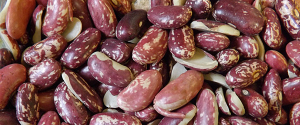 One of the earliest cultivated crops, beans offer nourishment to both us and the soil. As is the case with all legumes, they are nitrogen fixers. This means that they have symbiotic bacteria within their root systems that produce nitrogen compounds that help the plant to grow. When the plant dies, it releases this nitrogen into the soil thus acting as a natural fertilizer.
One of the earliest cultivated crops, beans offer nourishment to both us and the soil. As is the case with all legumes, they are nitrogen fixers. This means that they have symbiotic bacteria within their root systems that produce nitrogen compounds that help the plant to grow. When the plant dies, it releases this nitrogen into the soil thus acting as a natural fertilizer.
Kidney Beans are an excellent source of vegetable protein, containing 15 grams of protein/cup. Because they are also a good source of soluble fiber, they have been shown to reduce serum cholesterol levels. They help regulate blood sugar levels because they are a complex carbohydrate, which supplies stable energy over a longer period of time than simple carbohydrates, that provide a burst of energy and then leave us feeling depleted.
This powerful little bean provides iron, that is an integral part of transporting oxygen to all of the body’s cells. Thiamin, a B-vitamin, is a critical component for brain cell and cognitive function and kidney beans have it in spades, as well as manganese, essential for energy production and supporting our antioxidant defense systems.
Unsure of trying kidney beans because of unwanted intestinal gas? Those unfortunate side effects come from complex trisaccharide sugars, stachyose and raffinose, that our systems cannot digest. Soak your beans for at least 8 hours (overnight makes it easy!) to leach out those indigestible sugars and also phytic acid, which binds to the minerals. By removing phytic acid, the minerals become more available to our metabolisms. Do NOT cook your beans in the soaking water, which now contains the phytic acid and the undigestible sugars. Strain them, rinse thoroughly, and then cook. Soaking cuts down on the cooking time, too.
